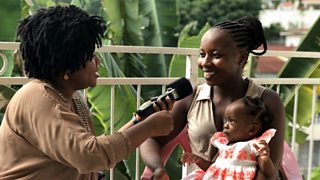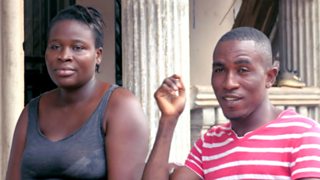Radio show tackles malaria myths in Sierra Leone
Mariama Sesay
Lead Producer, Βι¶ΉΤΌΕΔ Media Action Sierra Leone
As our malaria myth-busting radio show in Sierra Leone, , enters its second series, hear from Mariama Sesay, the show's Lead Producer, about her personal reflections on the disease and what audiences have learnt and done as a result of tuning in.
As a mother of four children and a guardian of eight others, you can imagine I have a lot of sleepless nights and frequent headaches finding treatment for their regular illnesses.
I have a first aid box in my house that I count on to treat minor things such as headaches and scrapes. But I developed a bad habit: self-diagnosis. I would always treat my children for a few days at home before taking them to a health centre. This was fine until one day, a few years ago, I had a terrifying experience with my youngest son, Thaimu, who was then five years old.
I had noticed that he had a high fever, did not have his usual energy and had lost his appetite. Initially I treated him at home for a few days using medicines from my first aid kit but then he suddenly collapsed, and I had to rush him to hospital. Doctors had to perform immediate tests to figure out what was wrong. The diagnosis? Malaria.
Thankfully, Thaimu’s life was saved thanks to an emergency blood transfusion, for which I am eternally grateful to all of the hospital staff. But this experience taught me a lifelong lesson about self-diagnosis.

A mother being interviewed about her daughter recovering from malaria for radio show Tawa Fo Welbodi
Malaria accounts for 40% of deaths outside of hospital in Sierra Leone, many of which are preventable or treatable with the right care. In 2018, Βι¶ΉΤΌΕΔ Media Action received funding from Comic Relief and GSK to produce a series of radio shows about this life-threatening disease.
I’m the producer for Tawa Fo Welbodi (which means ‘determined for health’) – a weekly Krio-language radio show that aims to bust harmful malaria myths and misconceptions. In particular, the show is aimed at pregnant women, partners and caregivers – as expectant mothers and young children are especially vulnerable.
We cover issues ranging from prevention and treatment, prompt testing, misuse of bed nets and provision of anti-malaria drugs. The show recently ended its first run after 60 episodes, and in the final episode, we spoke to our Media Action colleagues about how it had impacted their own lives.
When we started the project, our driver Abu Kamara would argue that people could get malaria from drinking too much alcohol. But after listening to the show and driving the production team around, his perception changed. When asked in the final episode about the cause of malaria, Abu said that only a bite from a female mosquito infected with malaria parasites can transmit the disease.
We also spoke listeners to the programme, such as expectant mother Madiana Sheriff:
"Before now, my husband and I were not sleeping inside a bed net… it’s too hot and the routine of tucking it in and removing it in the morning. But listening to testimonies and advice from health workers on the Tawa Fo Welbodi radio programme, we were motivated to sleep inside a treated bed night every night.”

Madiana with her husband, Abdulrahim – both listeners of Tawa Fo Welbodi
We also shared the story of Kayakor, a small town in Northern Sierra Leone, where residents had no health centre and had to walk 18 miles to the nearest hospital. Sadly, many in the community had lost family members to malaria, as it would often go undiagnosed and untreated with the symptoms being attributed to witchcraft and other myths. We ran a Tawa Fo Welbodi community discussion event in Kayakor to spread accurate information about the disease. Afterwards the community clubbed together to construct a health centre which could give early testing for malaria.
The exciting news is that we’re now launching phase two of the project, in which we’ll be adapting the show to bring communities and local authorities together to find shared solutions to malaria.
Personally, I’ve learnt a lot about malaria this past year. Even though I still have my first aid box at home, I seldom use it for emergency conditions and now take my children immediately to my local health centre when I notice worrying symptoms. In the face of serious challenges posed by malaria, my team and I are enthusiastic and determined to continue encouraging changes that can ultimately save lives.
--
Mariama Sesay is Lead Producer for Βι¶ΉΤΌΕΔ Media Action Sierra Leone’s radio show Tawa Fo Welbodi, part of our Communication for Healthy Behaviours Achieving Reduced Malaria (CHARM) project funded by Comic Relief and GSK. .
And if you enjoyed this blog, you may also enjoy this piece by Eastina Massaquoi, the presenter for Tawa Fo Welbodi.
